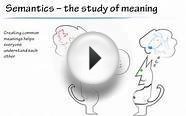
Semantics is
Explanation: This document is an attempt to make an arcane and not very well understood area of inquiry intelligible to someone who knows no logic or linguistics. It was originally written for an encyclopedia that wanted something accessible even to a pre-high-school audience. But it doesn't appear in any encyclopedia, because I wasn't willing to write something to the editors' specifications, and they weren't willing to change their specifications. This episode is yet another example of how bad a job semanticists have done of making even well-informed laymen aware of what the issues are in the field.
Semantics is the study of the meaning of linguistic expressions. The language can be a natural language, such as English or Navajo, or an artificial language, like a computer programming language. Meaning in natural languages is mainly studied by linguists. In fact, semantics is one of the main branches of contemporary linguistics. Theoretical computer scientists and logicians think about artificial languages. In some areas of computer science, these divisions are crossed. In machine translation, for instance, computer scientists may want to relate natural language texts to abstract representations of their meanings; to do this, they have to design artificial languages for representing meanings.
There are strong connections to philosophy. Earlier in this century, much work in semantics was done by philosophers, and some important work is still done by philosophers.
Anyone who speaks a language has a truly amazing capacity to reason about the meanings of texts. Take, for instance, the sentence
(S) I can't untie that knot with one hand.Even though you have probably never seen this sentence, you can easily see things like the following:
- The sentence is about the abilities of whoever spoke or wrote it. (Call this person the speaker.)
- It's also about a knot, maybe one that the speaker is pointing at.
- The sentence denies that the speaker has a certain ability. (This is the contribution of the word ‘can't'.)
- Untying is a way of making something not tied.
- The sentence doesn't mean that the knot has one hand; it has to do with how many hands are used to do the untying.
The meaning of a sentence is not just an unordered heap of the meanings of its words. If that were true, then ‘Cowboys ride horses’ and ‘Horses ride cowboys’ would mean the same thing. So we need to think about arrangements of meanings.
You might also like









